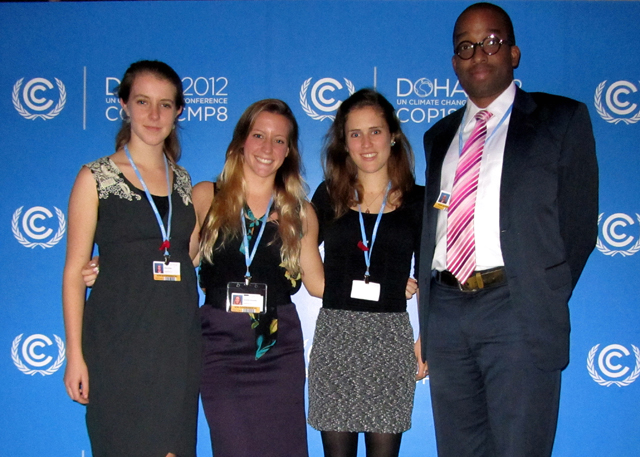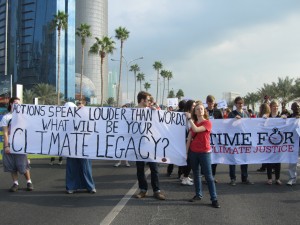Students, COE Fellow Participate in Climate Change Convention in Qatar

Three Wesleyan students joined hundreds of climate change activists from around the world to strategize with fellow youth, discuss climate change policy, engage with delegates and participate in a climate change march during the 18th Conference of the Parties (COP18) of the United Nations Framework Convention on Climate Change (UNFCCC) in Doha, Qatar.
The convention began Nov. 26. Sophie Duncan ’13, Samantha Santaniello ’13 and Chloe Holden ’15, accompanied by Michael Dorsey, fellow of the College of the Environment, visiting professor of environmental studies, obtained entry badges and jumped right into a panel discussion on equitable climate policies with representatives from the Third World Network.
“We were initially struck by the variety of people at the conference center, from young people much like us to VIP diplomats from different countries and generations, all of whom seem anxious to get started and work hard for the interests they represent,” Holden said.
Although youth participants were not able to participate directly in negotiations, the Wesleyan students quickly teamed up with about 150 youth delegates from around the world. Many youth represented civil society organizations including Climate Justice Now, Earth in Brackets, the Arab Youth Society, the Canadian Youth Climate Coalition, Climate Action Network, the Taiwan Youth Climate Coalition and the global youth constituency YOUNGO.
“After attending a YOUNGO meeting and conversations with a few students, I realized that this conference is an opportunity for we, the youth, to exchange ideas and strategies with activists, delegates, and any person we are able to interact with,” Santaniello said.
During the trip, the Wesleyan group attended the World Climate Summit, the International Emissions Trading Association meeting, an agricultural-themed meeting of the Subsidiary Body for Scientific and Technical Advice, and a panel on engaging communities in sustainable landscapes with enhanced adaptation. They attended discussions about climate-smart agriculture, indigenous rights and bioeconomy issues. Dorsey served as a panelist on “Climate Change and the World Court: The Role of Law.”

On Dec. 1, Duncan and Holden participated in a climate change march in Doha. They joined hundreds of conference participants and environmental groups who proudly marched down the Corniche, a palm-lined boardwalk along the Persian Gulf, carrying banners and chanting “climate justice now!” and “Hot air, no fair.”
“While the slow pace of negotiations and change within the conference center can be discouraging to all at times, the turnout and the collaboration in this march were truly inspiring,” said Duncan, who attended the conference to work on important, real-life issues in an international setting. “The march underscored in our minds the importance of being active global citizens, and is something we will remember for years to come.”
Santaniello, who is double majoring in the College of Social Studies and the College of the Environment, is writing her thesis on sustainable development in Western Samoa.
“I thought an offer to go to a conference on climate change would be ideal to get interviews of delegates from Samoa,” she said. “As the conference progressed, I realized that I didn’t take into account the actual threat that climate change poses to Pacific island nations. The time in Doha has certainly been productive and informative.”
“Climate change can be solved,” Santaniello said, “but only if we face the reality of the climate crisis. If we have more scientists, students, activists, and the general public demanding action to address the crisis, then maybe we’ll see fewer people shying away from the fact that global warming exists and climate change is a threat.”
Read more about the students’ activity at the Convention on Climate Change in this WesTalks Climate blog.
#THISISWHY

